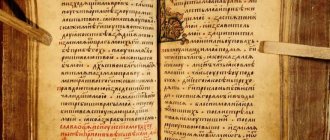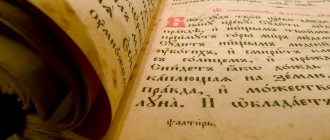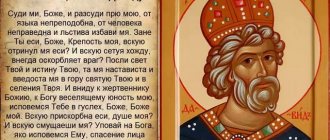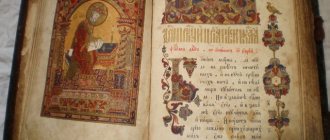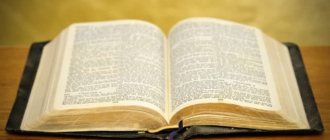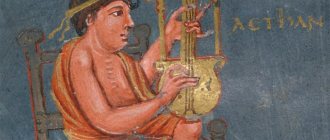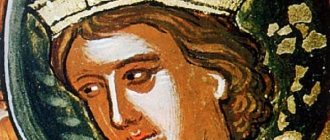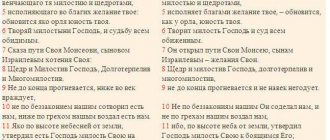Text of Psalm 27
The clergy use the text of Psalm 27 in Church Slavonic, in which it is heard in churches during services. The song of praise became part of the 4th kathisma. This version of the work written by the prophet is difficult to understand, so many believers prefer to read the Russian translation.
With accents in Church Slavonic
In Russian
Psalm 27 - text in Russian, why they read it, interpretation
Orthodox believers have a special order for reading the Psalter. The chapters are combined into kathismas (from 1 to 15), between which special prayers are read. For example, Psalm 27 is part of the 4th Kathisma. But it is quite possible to read them separately, because for some people such a volume may not be possible at one time. Then experienced confessors recommend choosing 2 or 3 psalms and reading only them.
Text of Psalm 27 in Russian
1 To You, O Lord, I will cry. My God, do not remain silent when you despise me, never remain silent when you despise me, and let me not become like those who go down into the pit.
2 Hear, O Lord, the voice of my prayer, when I pray to You, when I lift up my hands to Your holy temple.
3 Do not bring me together with sinners, and do not destroy me with those who do injustice, who speak peaceably with their neighbors, but evil in their hearts.
4 Give them, O Lord, according to their deeds and according to their evil deeds, according to the works of their hands, give them, give them their recompense.
5 For they have not considered the works of the Lord, nor the works of his hands; You will destroy them and not build them up.
6 Blessed be the Lord, that he hath heard the voice of my supplication.
7 The Lord is my helper and my protector; my heart trusted in him, and I received help; and my flesh flourished, and I diligently glorified Him.
8 The Lord is the stronghold of His people and the Protector of His anointed.
9 Save Your people and bless Your inheritance, and shepherd and exalt them forever.
Interpretation of Psalm 27
This is another of a series of verses telling about the period of persecution that his rebellious son Absalom inflicted on his father. David was already anointed king in the name of the Lord. The fugitive's position was unpleasant and difficult for him. After all, until the very end he believed that his son would come to his senses, and subsequently bitterly mourned his death.
- But David confided all his sorrows to the highest judge. He firmly believes that God will restore justice. In the first lines, the author calls on Him as his support. He calls the actions of his enemies unrighteous. After all, David’s kingdom was blessed from heaven, which means that the Israeli people must obey him. And people, incited by the rebels, threaten his very life.
- Therefore, the rebels go not only and not so much against him, but against the Lord Himself. And for the Jews this is equivalent to spiritual death. This is the interpretation of these lines.
The ruler is afraid to accept death at the hands of the wicked, because he considers such a death unworthy. He is afraid that in this way he will be equated with his enemies. But the last lines clearly state that God will protect his protege. And he promises to glorify Jehovah as it should be. In his final words, the king asks for salvation for those who remained faithful to him, as befits a good ruler.
The text itself is small, only 9 lines. But the author managed to express the whole range of experiences. There are a number of translations in Russian, it is a good idea to familiarize yourself with them all. This will help you feel everything that David put into these words.
- Psalm 108;
- Interpretation of Psalm 119;
- Psalm 139 - https://bogolub.info/psalom-139/.
When is the best time to read?
Why read Psalm 27? There are different opinions:
- it is recommended for those who suffer from nervous disorders;
- in a difficult financial situation;
- to acquire Christian humility.
Nevertheless, one cannot attribute any magical properties to specific psalms. Everyone is the Word of God. And it is useful to all believers, in any situation. From reading Scripture, a person’s soul seems to come to life and is filled with spiritual strength. Therefore, it will be blessed to recite any chapter from the Psalter, including Psalm 27.
History of writing
Psalm 27 was written at the same time as a number of others included in the Psalter collection. Experts who study the works of King David have no doubt about this. The song of praise became for the prophet a cry of the soul addressed to the Lord, and it remains such to this day for modern Christians.
The theme of the 27th Psalm is similar to the theme of the 26th, some suggest that this work continues it. This possibility cannot be excluded, because this text was composed by God’s anointed during the time of his persecution, the uprising organized by Absalom. Fleeing from his son and his entourage, David hoped to ensure his safety in his wanderings. All this time he hoped in the Almighty, his mercy, prayed for a fair trial for apostates, for punishment for enemies. An important emphasis in the work is placed on the theme of saving the soul of the righteous.
When Psalm 27 is read. General rules
In relation to Psalm 27, we can identify key situations in which reading or listening to an audio version of the psalm will serve as a source of inspiration, support for resolving difficult circumstances:
▪️ Difficult family problems. Family problems are part of the hectic world, you have to come to terms with the fact that they will happen. Two souls are not always consonant in their thoughts, they do not fully understand each other, and their motives are mutual.
▪️ In times of financial collapse, unfavorable life circumstances. If the situation has really come to the point of “a lump in your throat”, remember:
▪️ Life in poverty, asceticism and fasting is the lot of the elect, a feat of monks and hermits who received the Lord’s blessing for this. The lot of believers living in the world is honest work and a fair reward for it.
▪️ The dream of living in abundance in a home, of a stable life and confidence in the future, of a secure old age and a good arrangement for children is not a sin if a person earns his own money in an honest way and does not forget to take care of the weak and poor.
Nervous disorders. Valerian and motherwort will not help when your soul is a complete mess and bedlam, you need to resolve the contradiction of intentions.
The meaning of Psalm 27
Verses 1 to 3: The king asks God to answer his repentance and prayer. He hopes that the Almighty will not remain silent and turn a blind eye to the evil deeds of the lawless. He does not believe that the Lord will reject the requests of the innocent, so he does not stop crying out to heaven. David admits that he is not sinless; in his life he has made many mistakes, which he sincerely regrets, counting on the mercy of the One Creator.
Verses 4 and 5: In this part of the work, vice describes his feelings towards the traitors, because of whom he is forced to flee. He believes that God will grant protection to him and his family. He does not wish death on his enemies, but wants them to be judged fairly.
Verses 6 to 8: The author expresses hope for salvation through faith in the Lord, because he is salvation itself.
Orthodox help for the sick Psalm 27
no comments
The text of Psalm 27 was written by King David at a time when he was already the legitimate anointed ruler of Israel and was undergoing many sorrows due to the betrayal of his son Absalom. History tells that King David had many children from different wives, and it so happened that some of them were at enmity with each other. Proximity to the royal throne often makes people mad; One of the sons of the Israeli ruler Absalom was no exception. Having decided to displace his father and take his place, he enlisted the help of the nobility close to the Prophet David, through whom he openly tried to win the people of Israel to his side.
From the interpretation of the 27th Christian Psalm, it is known that David was aware of Absalom’s plan, and that many of his comrades warned him of the danger, but he did not want to run away from his own son. Ultimately, he was forced to go on the run, and this circumstance greatly undermined his health, but did not affect his faith in God. The Orthodox Church recommends reading and listening to Psalm 27 for people suffering from nervous diseases.
Listen to the video of the Orthodox prayer Psalm 27 in Russian
Read the text of the Christian prayer Psalm 27 in Russian
To You, Lord, I cry: my stronghold! do not be silent for me, lest in Your silence I become like those who go down to the grave. Hear the voice of my prayers when I cry out to You, when I raise my hands to Your holy temple. Do not destroy me with the wicked and with those who do injustice, who talk about peace with their neighbors, but have evil in their hearts. Reward them according to their deeds, according to their evil deeds; Repay them according to the works of their hands; give them what they deserve. Because they are not attentive to the actions of the Lord and to the work of His hands, He will destroy them and will not build them up. Blessed be the Lord, for He has heard the voice of my prayers. The Lord is my strength and my shield; My heart trusted in Him, and He helped me, and my heart rejoiced; and I will glorify Him with my song. The Lord is the strength of His people and the saving defense of His anointed. Save Your people and bless Your inheritance; feed them and raise them up forever!
Orthodox Psalter, Psalm 27 in Church Slavonic
To you, O Lord, I will cry, my God; don’t keep silent about me; Yes, never keep silent about me, and I will become like those who go down into the pit. Hear, O Lord, the voice of my prayer, always praying to you, always raising my hands to your holy temple. Do not attract me with sinners, and do not destroy me with those who do injustice, who speak peace with their neighbors, but evil is in their hearts. Give them, O Lord, according to their deeds and the wickedness of their undertakings, give them your hand according to their deeds, reward them with their reward. Because you have not understood the works of the Lord and the work of his hand; I will destroy and I will not create. Blessed is the Lord, for he has heard the voice of my prayer. The Lord is my helper and my protector; in him my heart trusts, and help me, and prosper my flesh; and let me confess my will to him. The Lord is the affirmation of his people and the protector of the salvation of his Christ. Save your people, and bless your inheritance, and protect, and exalt, forever.
Why and how to read Psalm 27: text in Russian
Sincerity and frankness, a person's recognition of his own helplessness, a truthful story about his own sins and an appeal to God for support and consolation - this is what is characteristic of the verses of the Psalter.
Psalm 27 is one of the most striking examples of lyrical prayer poetry.
The Story of Psalm 27
Consciousness of one's own powerlessness and endless faith in the power of the Almighty permeate every line of this psalm.
about the author
It is believed that the author of the psalm is the second Israeli king, David, who during his long life was a shepherd, hunter and warrior.
If we talk about inscriptions, then the authors of the poetic revelations included in the Psalter could have been other biblical characters:
According to legend, the king was buried on Mount Zion, precisely in the place where a number of significant events later took place, described in the New Testament:
- Descent of the Holy Spirit;
- Last Supper;
- interrogation of Christ;
- Assumption of the Virgin Mary.
History of writing
Researchers believe that Psalm 27 was composed by David during a period when he was hiding from his own son Absalom, who was preparing an uprising and the overthrow of his father. It is part of the king’s creativity during the period when he fled from his own son and was forced to hide.
Analysis of the text shows how the author felt at that moment.
David firmly believes that the Lord will restore justice and asks him to have mercy on those who wish the king death.
The second part of the song is a thank you part. In it, the king thanks God in advance for salvation, and the Almighty does not deceive the hopes of the sinner king.
Text of Psalm 27
1 To You, O Lord, I will cry. My God, do not remain silent when you despise me, never remain silent when you despise me, and let me not become like those who go down into the pit.
2 Hear, O Lord, the voice of my prayer, when I pray to You, when I lift up my hands to Your holy temple.
3 Do not bring me together with sinners, and do not destroy me with those who do injustice, who speak peaceably with their neighbors, but evil in their hearts.
4 Give them, O Lord, according to their deeds and according to their evil deeds, according to the works of their hands, give them, give them their recompense.
5 For they have not considered the works of the Lord, nor the works of his hands; You will destroy them and not build them up.
6 Blessed be the Lord, that he hath heard the voice of my supplication.
7 The Lord is my helper and my protector; my heart trusted in him, and I received help; and my flesh flourished, and I diligently glorified Him.
8 The Lord is the stronghold of His people and the Protector of His anointed.
9 Save Your people and bless Your inheritance, and shepherd and exalt them forever.
Interpretation
According to the content, the text of the prayer in Russian is divided into two parts: crushing and laudatory.
The essence of the psalm can be traced in more detail through the verses:
- In verses 1-3, the king asks the Most High to answer, not to ignore his prayer.
- The author understands his sinful nature and turns to God for mercy.
- Verse 4 is a request to God to intercede for the persecuted king.
- The reasoning in verse 5 is that when people do not receive immediate punishment, they believe that they will remain unpunished altogether.
- Verses 6-8 already fully reveal the ruler's hope in God. He thanks the Lord for the fact that the prayer was heard and calls him the only Savior of man.
- In the final verses, the king asks God, but not for himself, but for the entire people of Israel, despite the fact that part of him supports Absalom.
Why do they read?
When and to whom it is better to read the twenty-seventh hymn - there are different opinions on this matter.
It is believed to help those who:
- suffers from nervous disorders;
- found himself in a difficult financial situation;
- needs to acquire Christian humility.
However, one cannot consider a verse a kind of spell or attribute magical properties to it. First of all, it is prayer. Therefore, it will be useful to recite any chapter from the Psalter, in particular the psalm in question.
Reading rules
In Orthodox worship, there is a special order for reading the Psalter, which is divided into twenty kathismas, between which special prayers are read.
The twenty-seventh psalm is part of the 4th kathisma.
Not everyone will be able to cope with such a volume, so experienced confessors advise choosing two or three psalms for yourself and reading only them.
Thus, no one forbids you to read canto 27 if it pleases you more than others and meets your spiritual needs.
Video about reading Psalm 27
Watch the video in which you will hear the 27th Psalm read aloud.
Explanatory Bible Commentary on the Psalter
The psalm could have been written by David during persecution from Absalom, when he fled from Jerusalem and was far from the sanctuary (Ps. 27_2); he was already the anointed king over all the people (“anointed one” Ps. 27_8 v.), and his enemies, under the pretext of caring for the good of the people and the world, actually hid and pursued personal goals (Ps. 27_3). This was David's position during his flight from Jerusalem from Absalom.
God! Hear my prayer with which I address Your temple (1-2). Do not let me perish along with the wicked, but punish the latter for their neglect of Your works (3-5). Confident that the Lord will protect, David blesses Him and prays for mercy on his people (6–9).
Ps.27:1. To you, Lord, I call: my stronghold! do not be silent for me, lest in Your silence I become like those who descend into the grave.
“Do not be silent for me” - do not be inattentive to my prayer, listen and help me.
Ps.27:2. Hear the voice of my prayers when I cry out to You, when I raise my hands to Your holy temple.
“I raise my hands. to Your temple” is the custom of praying with raised hands towards the temple, as the dwelling place of the Lord.
Ps.27:3. Do not destroy me with the wicked and with those who do injustice, who talk about peace with their neighbors, but have evil in their hearts.
Since God is just and fair, and David’s enemies act unworthily and sinfully, he is confident that they will be punished by God. David's present situation, pursued by these enemies, is so difficult and dangerous that it threatens his life. His death from lawless enemies seemed to equate his fate with the fate of the latter, and from here he appeared as if unclean. The said prayer of David then has the following meaning: do not destroy me, lest I become equal to the wicked.
Ps.27:5. Because they are not attentive to the actions of the Lord and to the work of His hands, He will destroy them and will not build them up.
“Not attentive to the actions of the Lord and to the work of His hands” - David’s enemies are guided in their actions by personal desires, not caring that their actions can and do go in disagreement with the works of God. The latter refers to God’s definitions regarding David, whom he anointed as king (see and who, therefore, is commanded by God to show obedience on the part of the people. David’s enemies do not want to listen to this “action” of the Lord, but want to overthrow him, which causes anger upon themselves The Lord who will “destroy” them.
The latter refers to God’s definitions regarding David, whom he anointed as king (see and who, therefore, is commanded by God to show obedience on the part of the people. David’s enemies do not want to listen to this “action” of the Lord, but want to overthrow him, which causes anger upon themselves The Lord who will “destroy” them.
Recommendations
- Arthur Weiser (October 1, 2000). Psalms: Commentary
. Westminster Press by John Knox. p. 251. ISBN 978-0-664-22297-0. - "Psalm 27 (New International Version)." Bible Study Tools
. Retrieved 2018-09-29. - "Psalm 27:1". Bible Center
. Retrieved 2018-09-29. - Haydock, George Leo. "Psalm 26 (27 in modern numbering)." Haydock's Catholic Bible Commentary, 1859 edition
. Archived from the original on 2016-04-03. Received 2018-09-30. - Henry, Matthew. "Commentary on the Whole Bible - Psalm 27." Bible Study Tools
. Retrieved 2018-09-29. - Charles H. Spurgeon, Treasury of David Archived 2014-12-04 in the Wayback Machine.
- Psalm 27:4–6.
- Psalm 27:7–12.
- ^ a b
Rabbi Benjamin J. Segal Psalm 27. - Nicolaas Hermann Ridderbos: Die Psalmen: Stilistische Verfahren und Aufbau mit besonderer Berücksichtigung von Psalm 1-41, (Berlin, 1972), p. 211.
- The Complete Artscroll Siddur p.170
- Complete Artscroll Machzor scroll for Rosh Hashanah page 349
- Full list Artscroll Machzor for Rosh Hashanah page 465
- The Complete Artscroll Siddur, page 477
- The main cycle of liturgical prayer lasts four weeks.
- Reginald K. Fuller, Leonard Johnston, Conleth Kearns (eds.), The New Catholic Commentary on Scripture
(Nelson 1969) - Mary Kathleen Glavic, The Catholic Companion to the Psalms
(ACTA Publications 2008 ISBN 978-0-87946364-9), para. 25 - Pope John Paul II General Audience, Wednesday, April 28, 2004.
- Matthew Henry, Psalm 27.
- Calvin's Commentaries, vol. 8: Psalms, part I, translated. John King, [1847-50], at sacred-texts.com.
- The Stand, A Call to Perseverance of the Saints, John Piper
Psalm 27 – listen and read the text. Interpretation.
Old Testament
Psalter
- Book of Genesis
- Book of Exodus
- Book of Leviticus
- Book of Numbers
- Book of Deuteronomy
- Book of Joshua
- Judges
- Book of Ruth
- 1st Book of Samuel
- 2 Samuel
- 1st Book of Kings
- 2nd Book of Kings
- 1 Chronicles
- 2 Chronicles
- Book of Ezra
- Book of Nehemiah
- Book of Esther
- Book of Job
- Psalter
- Book of Proverbs of Solomon
- Book of Ecclesiastes
- Book of Song of Songs
- Book of the Prophet Isaiah
- Book of the Prophet Jeremiah
- Book of Lamentations
- Book of the Prophet Ezekiel
- Book of the Prophet Daniel
- Book of the Prophet Hosea
- Book of the Prophet Joel
- Book of the Prophet Amos
- Book of the Prophet Obadiah
- Book of the Prophet Jonah
- Book of the Prophet Micah
- Book of the Prophet Nahum
- Book of the Prophet Habakkuk
- Book of the Prophet Zephaniah
- Book of the Prophet Haggai
- Book of the Prophet Zechariah
- Book of the Prophet Malachi
Sorry, your browser does not support viewing this video. You can try downloading this video and then watch it.
Here you can listen and read the text of Psalm 27
Interpretation of Psalm 27
Verses 2 and 8 in this psalm suggest that it was written in the days when David was fleeing from Absalom. Evidence of this can be seen in other verses.
Ps. 27:1
. The Lord’s silence in response to David’s prayer is “like death” for him.
Ps. 27:2-4
. Apparently, at this time, David (being outside of Jerusalem) could not come to the holy temple (tabernacle), he could only “raise” (stretch out) his hands towards it when he cried out to the Lord.
In verse 3, David asks the Lord to spare his life so that destruction, the fate of “the wicked and the workers of iniquity,” would not become his fate. The second part of this verse: (they) speak (to their neighbors) of peace, but in their hearts there is evil - perhaps confirms the assumption that by “the wicked” here Absalom and his supporters were meant, since it was Absalom who promised the people a just peace court and prosperity, turned him against his father.
In verse 4 there is a request for retribution for the “wicked” according to their deeds and evil deeds.
Ps. 27:5
. “Lack of attention to the actions of the Lord and to the work of... His” (verse 5) could be understood as the rebels' disdain for the Lord's decision to have David on the throne of Israel. The psalmist expresses confidence that for this the Lord will destroy them (doom them to defeat and death).
Ps. 27:6-9
. “The Lord... heard” The past tense in which this phrase appears may indicate a favorable sign received by David from above, but it may also be the “form” in which the psalmist puts his confidence that the voice of his prayers will be heard. The same applies to verse 7. In this and the last verse, David blesses the Lord because He “is not silent” (verse 1) to him.
By calling himself “the anointed one” in verse 8, David in some way “clarifies” the time of writing this psalm: its author was already anointed king.
Verse 9 is a prayer for the salvation, blessing and upliftment of the people of Israel.
You can learn more about God and the Bible on the website The Bible about God
Structure
The coat of arms of Oxford University shows the first verse of Psalm 27.
Catholic doctrine has traditionally treated the Psalm in two sections. The first section proclaims the power of God and the boundless hope that God will bring salvation and protection from all enemies.[7] The second part has a clear change in tone with the statement "I believe".[8] Some scholars argue that these may originally have been two different psalms.[9][10]
In Hebrew, the first three verses increase in number: two parallel phrases of five words each, then six, then seven (hinting at the completion in Hebrew numerology).[9]
